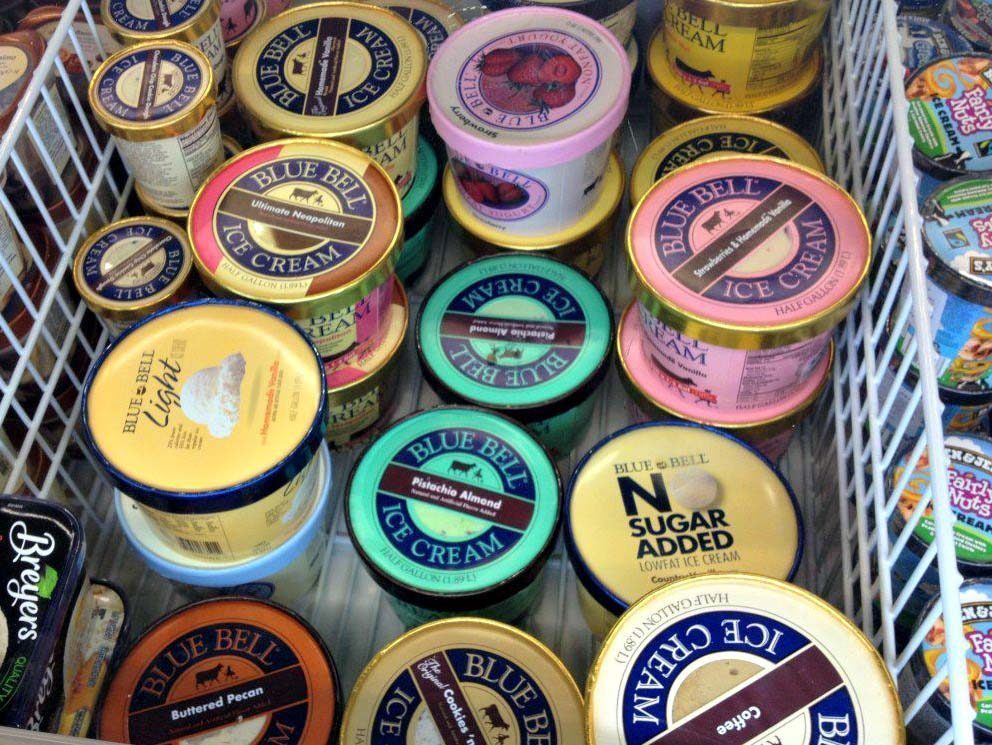
An American company that makes Blue Bell ice cream has recalled all its frozen products in the US and some countries internationally – including Qatar – after a listeria outbreak that is believed to have caused three people to die, and 10 to become seriously ill.
On Monday, Bluebell Creameries issued a statement ordering the recall of “all of its products currently on the market made at all of its facilities including ice cream, frozen yogurt, sherbet and frozen snacks because they have the potential to be contaminated with Listeria monocytogenes.”

Supermarkets in Qatar that usually stock the product do not appear to have received any notification of the recall by local authorities yet, but at least two stores said they have voluntarily removed the ice cream from their freezers.
A representative from Megamart at The Center told Doha News that all Blue Bell products were removed last night, after being advised of the recall by a supplier.
Earlier this morning, Monoprix had some nine different Blue Bell ice cream flavors in stock, as well as some of the brand’s popsicles.
However, these have all since been removed, a supervisor told Doha News, although he said that the store had still not received any formal order to do so from Qatar authorities.
Health advice
Yesterday, the US Center for Disease Control and Prevention (CDC) advised consumers to not eat any Blue Bell brand products, and instructed institutions and retailers to stop serving or selling the ice cream while the manufacturing company investigates the source of the contamination.
The listeria organism can cause serious and sometimes fatal infections, particularly in children, the elderly, those with a weakened immune system and pregnant women. The bacteria can cause fever, muscle ache, confusion, loss of balance and convulsions.
Infections during pregnancy can lead to miscarriage, stillbirth, premature delivery, or life-threatening infection of the newborn, according to the CDC.
In its most recent statement, the CDC added:
“This is a complex and ongoing multistate outbreak investigation of listeriosis illnesses occurring over several years. Several strains of Listeria monocytogenes are involved in this outbreak. Information indicates that various Blue Bell brand products are the source of this outbreak.”
Bluebell Creameries is a Texas-based company that has been making ice cream for 108 years.

It issued the blanket recall after pulling some products from stores over the previous few weeks. The recall comes while authorities investigate the deaths of three people in the state of Kansas over the past year, and 10 cases of illness after people contracted listeriosis – five in Kansas, three in Texas, one in Arizona and one in Oklahoma.
“We’re committed to doing the 100 percent right thing, and the best way to do that is to take all of our products off the market until we can be confident that they are all safe.
We are heartbroken about this situation and apologize to all of our loyal Blue Bell fans and customers. Our entire history has been about making the very best and highest quality ice cream and we intend to fix this problem. We want enjoying our ice cream to be a source of joy and pleasure, never a cause for concern, so we are committed to getting this right,” said Paul Kruse, Blue Bell CEO and president in a statement.
The recall affects 23 states within the US and 27 countries and territories internationally.
In addition to Qatar, they are: Anguilla, Belize, Bermuda, Chile, China, Dominica, Dominican Republic, Egypt, Haiti, Jordan, Kuwait, Mexico, Montserrat, Oman, Panama, Peru, Philippines, Puerto Rico,, St. Kitts and Nevis, Saudi Arabia, Tortola, Trinidad and Tobago, Turks and Caicos, United Arab Emirates, Yemen and St. Croix St. Thomas in the US Virgin Islands.
The first case of illness dates back to January 2010, although the cause of the bacteria is still unknown.
Investigation
Blue Bell said it is investigating all its manufacturing facilities after initial tests found Chocolate Chip Cookie Dough Ice Cream half gallons produced on March 17, 2015, and March 27, 2015, contained the bacteria.
It said it was operating a “test and hold” process for all its products, rigorously testing all its foodstuffs to ensure they are safe before they are released to the market.
It said it has also increased its swabbing and testing of all its facilities and sending samples daily to a leading microbiology laboratory for testing and is providing additional employee training.
Thoughts?







